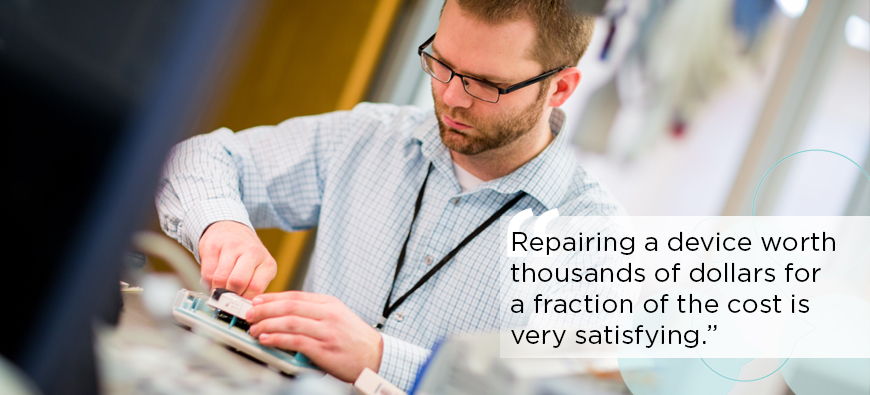
Introducing… a biomedical technologist
Adam DeMeester is a biomedical technologist at Hamilton General Hospital. He’s been with Hamilton Health Sciences for 10 years.
What do you love most about your role?
I enjoy looking into new ways of saving money for the hospital. Repairing a device or part worth thousands of dollars for a fraction of the cost—while maintaining device integrity—is satisfying. Also, as much as I enjoy working with technology, I really enjoy the people I work with and meet throughout the hospital. We communicate with nurses, doctors, management, vendors and patients on any given day to resolve equipment issues or reduce incidents.
What do you find challenging?
Working on unfamiliar equipment or being placed in a difficult situation, such as when a piece of equipment fails while a patient is on the table, can add stress. Everyone is looking at you to fix the problem as soon as possible, and troubleshooting can take some time. I’ve noticed as the years go on, I have become more comfortable working in stressful situations and can look at past experience in order to cut down on repair time. We work on hundreds of different, complex devices; you can’t know everything, as much as we try.
Describe a typical day
A typical day in biomed usually involves repairs or completing preventative maintenance on medical devices using calibrated test equipment. During this time, we can be pulled away to work on an issue in any department. Successfully solving equipment issues while it is still in use is fairly typical. We’re also involved with projects, RFPs, equipment investigations/recalls and working with vendors is just another part of a typical day at the office.
Purchasing new equipment would have been approximately 70 times the cost of repairing. The biomedical technology team saved the organization thousands of dollars by repairing existing medical equipment.
Tell us about your most gratifying experience at HHS
There isn’t necessarily just one gratifying experience, but anytime we find a way to save the hospital money is gratifying. I love to investigate equipment failures and find a way to repair or prevent future damage. Most recently, I repaired two bladder scanner probes our vendor suggested replacing. After the repair, they were tested to specification and returned for use. Purchasing new probes would have been approximately 70 times the cost of repairing both. With sustainability being top of mind in health care, it was just one example of how our team can lower costs.
What’s one thing people would be surprised to learn about your role?
People might be surprised to learn how involved we can be with equipment and equipment planning. Asking biomed to be involved in a project or purchase could save thousands of dollars while providing equal or better quality of service. We’re always available to answer any questions regarding a department’s medical equipment needs and are happy to assist when needed. Informing our team is a proactive measure to make sure any unforeseen technical issues are addressed before moving forward.
